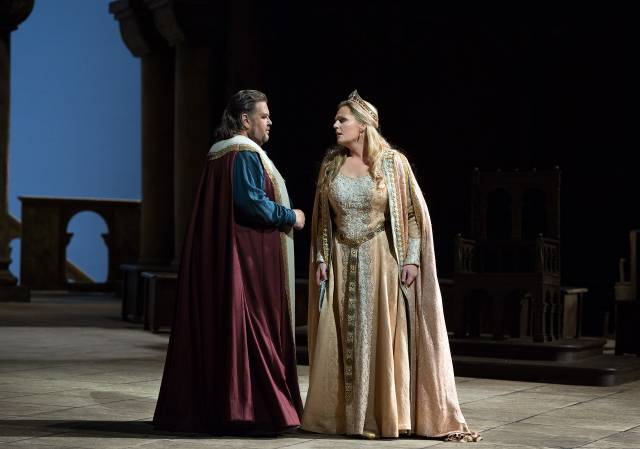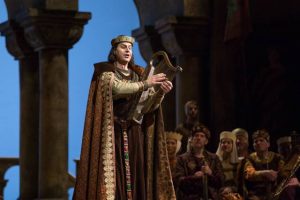

Most operas, whether comic or tragic, depict passionate romantic love. Richard Wagner’s Tannhäuser explores a different kind of passion, that of a religious journey. It concerns the poet Tannhäuser, who, at the opera’s beginning has been hanging out with none other than Venus, the goddess of love and desire. Seemingly sated of her charms he tells her it is time for him to go back to earth and rejoin mortal existence. Although the goddess tries to stop him, he departs. What he finds when he gets back to earth sends him on a spiritual quest for redemption. This does not come easily (or quickly). To redeem himself Tannhäuser must make a pilgrimage to Holy Rome.
Highly philosophical and Christian in its outlook, this is a far cry from the epic adventures of battling gods, terrible dragons and scheming dwarves depicted in Wagner’s Ring Cycle. But the music is some of Wagner’s most fun and accessible; the famous overture containing the Pilgrims’ chorus is a popular piece for radio and concert halls. And the song to Venus is a delightful, familiar theme expressing gratitude and joy to the goddess of love.
This season the legendary James Levine returns to conduct in the epic, traditional production originally staged by Otto Schenk in 1978. The sets by Gunther Schneider-Siemssen are breathtaking, depicting the heights of German romanticism on a grand scale, like great 19th century German paintings brought to three-dimensional life. They seem to transport the audience to the very landscape of Wagner’ mind; romantic pastoral scenes appear and vanish with the use of scrims and an astonishing lighting designed by the brilliant Gil Wechsler.
However, conceptually speaking, this production is lackluster. The themes and ideas of the piece are not expressed in the staging, rather the singers are given magnificent, traditional sets on which to perform, one replacing another as needed by the score, and lovely costumes to wear. And that’s about it.
In keeping with the traditional nature of the production, the role of Tannhäuser is truly sung rather than acted by the South African tenor Johan Botha. Although he was at times drowned out by the orchestra and even by some of the other singers onstage, his voice is lovely, especially in the higher register, sounding like an oboe at times. Michelle DeYoung is powerful and alluring as Venus, her voice as strong and magical as a goddess’s would be. And as Elisabeth, Eva-Maria Westbroek is stunning, filling the house with her rich soprano voice.

But the grandest performance is that of Peter Mattei as Wolfram. He is magnificent throughout, with a pure, golden voice reminiscent of a viola. He saves his most astonishing singing for the Act Three aria, O du, mein holder Abendstern ("Oh, beloved evening star"). His later duet with Botha is a joy to hear.
Ying Fang of the Met’s Young Artist Development Program is a delight as the young shepherd in Act 2. Her voice is truly lovely, high and melodious yet powerful, perfectly complementing the rest of the cast.
Levine, despite recent health problems, continues to show his incredible talent for interpreting Wagner. Just about everything sounds nearly perfect, the tempo, the balance of the different parts of the orchestra, and the magical phrasing. Tannhäuser has not been presented by the Met since 2004, making it one of the oldest of Met productions. It is recommended for its music, singing, sets and its incredible textbook of what lighting design can be. It may not return to the Met stage for a long time, if ever, and it should be seen and heard by anyone wanting a glimpse into a bygone operatic world.
Performances of Tannhäuser continue through October 31. For tickets visit: https://www.metopera.org/